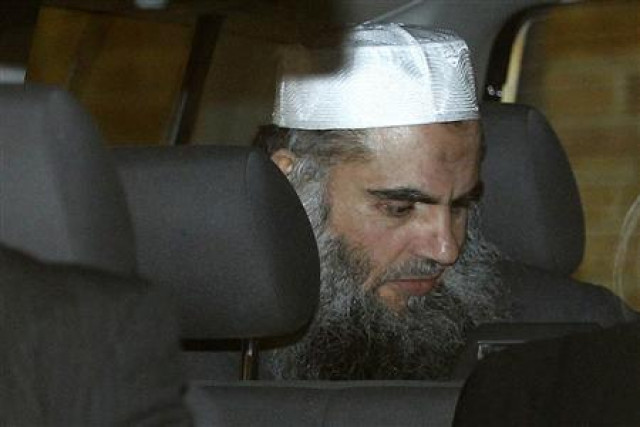Britain seeks to deport radical cleric Abu Qatada to Jordan
England says new assurances from Jordan were enough reason to deport him to Jordan where is wanted.

Jordanian preacher Abu Qatada had been under virtual house arrest at his family home in London since February, when he was freed from a British prison after a court said his detention without trial was unlawful.
The court's decision followed a ruling by the European Court of Human Rights in January that Qatada would not receive a fair trial in Jordan because evidence against him might have been obtained through the use of torture.
Home Secretary (interior minister) Theresa May said reassurances from Jordan meant Britain could now proceed with his deportation and comply with the European court's ruling.
"British courts have found that Abu Qatada is a dangerous man. He is a risk to our national security and he should be deported to Jordan," May told parliament.
"I believe the assurances and the information we have gathered will mean we can soon put Qatada on a plane and get him out of our country for good."
Under the deal struck with Jordan, May said, Qatada would be tried by a court used to hearing criminal cases and not a quasi-military body, the case would be heard in public with civilian judges, and his conviction in absentia would be quashed.
His two co-accused have received pardons and can give evidence against him freely without any fear for their safety, she said, and changes to the Jordanian constitution now banned the use of testimony obtained using torture.
Lawyers for Qatada poured scorn on the assurances and said they would appeal against the deportation.
"The Secretary of State (May) is clutching at straws," defense lawyer Edward Fitzgerald told a bail hearing for Qatada.
Britain has been trying to deport Qatada, whose real name is Omar Othman, for more than a decade and his case has become an important test of how Britain treats foreign suspects accused of having links with groups such as al Qaeda.
It has embarrassed the British government and prompted calls from politicians to defy the European court and deport the cleric before London hosts the Olympic Games in July and August.
Britain says videotapes of his sermons were found in a German apartment used by three of the men who carried out al Qaeda's September 11, 2001 attacks on the United States. Qatada, a father of five, denies belonging to al Qaeda.
A court in Jordan found him guilty in absentia of involvement in two bomb plots and a senior British judge has described him as a "truly dangerous" supporter of radical Islamist groups.
Bin Laden’s "right-hand man"
He was described as bin Laden's "right-hand man in Europe" by Spanish high court judge and human rights investigator Baltasar Garzon in 2004 after 191 people were killed by bombs put on board commuter trains in Madrid by Islamist militants.
"I know that many honorable members are frustrated by Strasbourg's ruling and by the time it is taking to deport him. I share their frustration entirely," said May, who travelled to Jordan in March to seek an agreement to allow deportation.
"With the assurances we have received we can have confidence in our eventual success."
Qatada appeared in the dock at a specialist court in the basement of a judicial building in central London, where he heard the government wanted to send him home by April 30.
The judge refused Qatada bail, saying the possibility of imminent deportation meant the risk he would abscond had "significantly increased."
He said he would review this in two or three weeks if the deportation process was delayed. Until then Qatada was to be held at the high-security Belmarsh prison in London.
If Qatada is granted an appeal it will not be heard until October and May herself admitted it could be many months before he left Britain.
Al Qaeda warned Britain last week against sending Qatada to Jordan, saying in a statement on an Islamist website that such a move would open the "door of evil" for the British government and its people.
Qatada was born in 1960 near Bethlehem, then part of Jordan and now of the Israeli-occupied West Bank. Never formally charged with an offence, he has been in and out of custody since he was first detained under British anti-terrorism laws in 2002.



















COMMENTS
Comments are moderated and generally will be posted if they are on-topic and not abusive.
For more information, please see our Comments FAQ